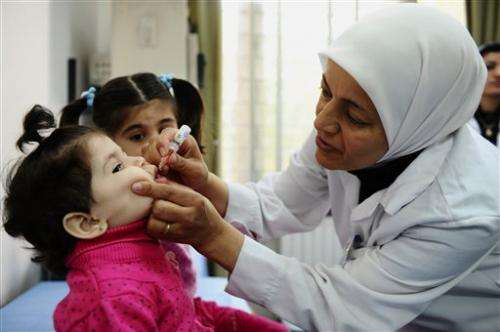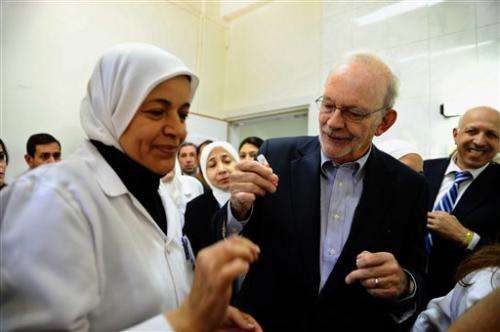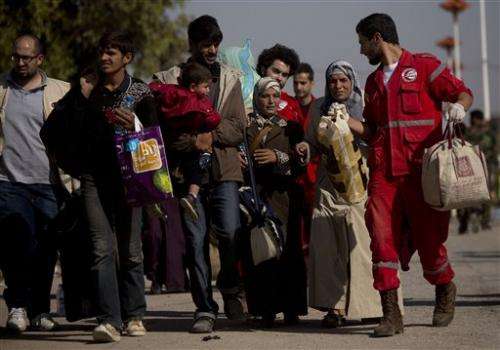UN officials confirm polio outbreak in north Syria

The U.N. confirmed an outbreak of polio in Syria for the first time in over a decade on Tuesday, warning the disease threatens to spread among an estimated half-million children who have never been immunized because of the civil war.
The grim finding added another layer of misery to a brutal conflict that has already killed more than 100,000 people and uprooted millions. The aid group Save the Children urged a "vaccination cease-fire" to try to prevent an epidemic of the highly contagious disease.
Meanwhile, hopes for a negotiated settlement to the three-year conflict appeared ever more distant as Syria's President Bashar Assad sacked a deputy prime minister for meeting Western officials to discuss the possibility of holding a peace conference—the latest blow to diplomatic efforts to bring the country's warring parties to the negotiating table.
At least 10 cases of polio among babies and toddlers were confirmed in northeastern Syria, the World Health Organization said—the first outbreak of the crippling disease in 14 years. Nearly all Syrian children were vaccinated against polio before the civil war began.
WHO spokesman Oliver Rosenbauer said the U.N. agency was awaiting lab results on another 12 suspected cases, mostly children under 2.
"This is a communicable disease. With population movements it can travel to other areas," Rosenbauer said. "So the risk is high of spread across the region."
Regionally, neighboring Lebanon and Jordan are likely to be at particular risk because the two countries have absorbed the bulk of Syrian refugees fleeing war-torn areas, where it's more likely that children haven't been vaccinated. The poorest refugees often crowd, several families together, into apartments and dilapidated shacks.
The polio virus usually infects children in unsanitary conditions through consuming food or drink contaminated with feces. It attacks the nerves and can kill or paralyze, spreading widely and unnoticed before it starts crippling children.
In an interview with The Associated Press in Damascus, UNICEF Executive Director Anthony Lake said his organization and WHO planned to immunize 2.4 million children throughout Syria. He said he had begun discussions with senior Syrian officials to access war zones, but hadn't started negotiating with rebels.
"Vaccinations and immunizations have absolutely no political content. They have no relationship to any military issues and therefore there is every reason ... (to) believe we will gain access into these communities," he said.
Syria said it had launched a vaccination campaign around the country days after the Geneva-based WHO said it had received reports of children showing symptoms of polio in Syria's Deir el-Zour province. But the campaign faces difficulty with lack of access.
Save the Children urged a "vaccination cease-fire" in Syria "to prevent the current polio outbreak from turning into an epidemic."

The group's chief executive, Justin Forsyth, said if the international community and the Syrian government could allow U.N. chemical weapons inspectors to fan out across the country, it could do the same for aid workers.
But armed clashes and government blockades have prevented medical workers and supplies from reaching rebel-held towns, activists said.
One blockaded rebel enclave is the besieged western Damascus suburb of Moadamiyeh, where activists reported last week that residents were eating boiled grape leaves and raw olives because they had run out of food. In September, they reported that six people there had died of illnesses related to malnutrition.
On Tuesday, rebels and Syrian forces observed a temporary cease-fire to allow nearly 2,000 residents to flee the neighborhood, the result of a rare agreement between warring sides to avert a humanitarian crisis.
Desperate men, women and children fearfully crossed over a no man's land, while some elderly and ill residents were carried by Red Crescent workers. Many young men were among those fleeing, and government officials said they included surrendering rebels, who were taken on separate buses.
Government official Aqil Iyad said residents were taken to temporary shelters. Around 3,000 residents of Moadamiyeh fled the area in late August during another rare cease-fire.
In a setback to efforts to bring a quick end to the conflict, Syrian Deputy Prime Minister Qadri Jamil was fired Tuesday after meeting in Geneva with the U.S. ambassador to Syria, Robert Ford.
The meeting on Saturday was to discuss the possibility of holding a peace conference next month in Geneva, State Department spokesman Jen Pskai said.
"We do regularly meet with Syrians with direct contact with the regime in Damascus," she said.
The decree relieving Jamil of his duties said he was fired for "undertaking activities and meetings outside the homeland without coordination with the government," the state news agency SANA said.

Sacking Jamil appeared to signal the government was hardening its stance—or that it feared he was jockeying for a position in a post-Assad Syria.
Jamil told Lebanon-based Al-Mayadeen TV that he also met with a Russian diplomat and U.N. officials. He did not say whether his moves were coordinated with Assad.
"I am not an employee," he said. "I am a political activist."
Assad has said in principle that his government will attend talks, but it will not negotiate with the country's disparate armed rebel groups.
The sacking occurred as the U.N.-Arab League envoy to Syria, Lakhdar Brahimi, was in Damascus to meet officials and opposition figures.
A key sticking point is Assad's future. Much of Syria's fractured opposition rejects any transition plan in which Assad or his circle are involved.
Also on Tuesday, unknown gunmen shot dead Mohammad Saeed, a well-known activist in Aleppo province who was an important source of information for international media, including the AP. The Aleppo Media Center said Saeed was shot dead by a gunman in a passing car in the town of Hreitan, where he was based.
Saeed was highly critical of Islamic extremists who have gained strength among the ranks of rebels across the country.
© 2013 The Associated Press. All rights reserved.


















